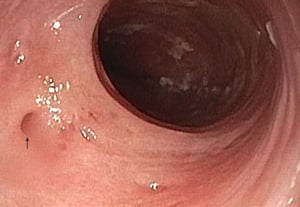- Overview of Esophageal and Swallowing Disorders
- Achalasia
- Distal Esophageal Spasm
- Dysphagia
- Dysphagia Lusoria
- Eosinophilic Esophagitis
- Esophageal Diverticula
- Esophageal Motility Disorders
- Esophageal Rupture
- Esophageal Web
- Gastroesophageal Reflux Disease (GERD)
- Hiatus Hernia
- Infectious Esophageal Disorders
- Lower Esophageal Ring
- Mallory-Weiss Syndrome
- Obstructive Disorders of the Esophagus
An esophageal diverticulum is an outpouching of mucosa through the muscular layer of the esophagus. It can be asymptomatic or cause dysphagia and regurgitation. Diagnosis is made by barium swallow; surgical repair is rarely required.
(See also Overview of Esophageal and Swallowing Disorders.)
This image shows a small diverticulum (arrow) in the upper esophagus.
Image provided by Kristle Lynch, MD.
Zenker diverticula are posterior outpouchings of mucosa and submucosa through the cricopharyngeal muscle. In this image, the diverticulum is on the left, next to the triangular opening of the trachea formed by the vocal cords.
Image provided by David M. Martin, MD.
Traction diverticula are midesophageal outpouchings of mucosa and submucosa caused by motility disorders or by traction resulting from mediastinal processes. In this image, the diverticulum is to the right of the esophagus and gives the appearance of a double lumen.
Image provided by David M. Martin, MD.
There are several types of esophageal diverticula, each of different origin:
Zenker (pharyngeal) diverticula are posterior outpouchings of mucosa and submucosa through the cricopharyngeal muscle, probably resulting from an incoordination between pharyngeal propulsion and cricopharyngeal relaxation.
Midesophageal (traction) diverticula are caused by traction resulting from mediastinal inflammatory lesions or, secondarily, by esophageal motility disorders.
Epiphrenic diverticula occur just above the diaphragm and usually accompany a motility disorder (eg, achalasia, distal esophageal spasm).
Symptoms and Signs of Esophageal Diverticula
A Zenker diverticulum fills with food that might be regurgitated when the patient bends or lies down. Aspiration pneumonitis may result if regurgitation is nocturnal. Rarely, the pouch becomes large, causing dysphagia and sometimes a palpable neck mass.
Traction and epiphrenic diverticula are rarely symptomatic, although their underlying cause may be.
Diagnosis of Esophageal Diverticula
Barium swallow
All diverticula are diagnosed by videotaped barium swallow and often confirmed on upper endoscopy.
Treatment of Esophageal Diverticula
Usually none
Sometimes surgical resection
Specific treatment is usually not required, although resection is occasionally necessary for large or symptomatic diverticula.
Diverticula associated with motility disorders require treatment of the primary disorder. For example, case reports suggest doing a cricopharyngeal myotomy when resecting a Zenker diverticulum. There are also endoscopic treatment options for diverticulectomy.




